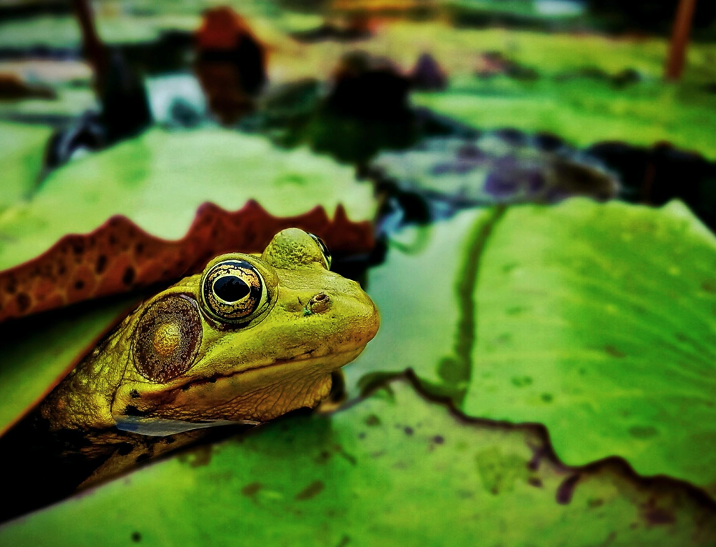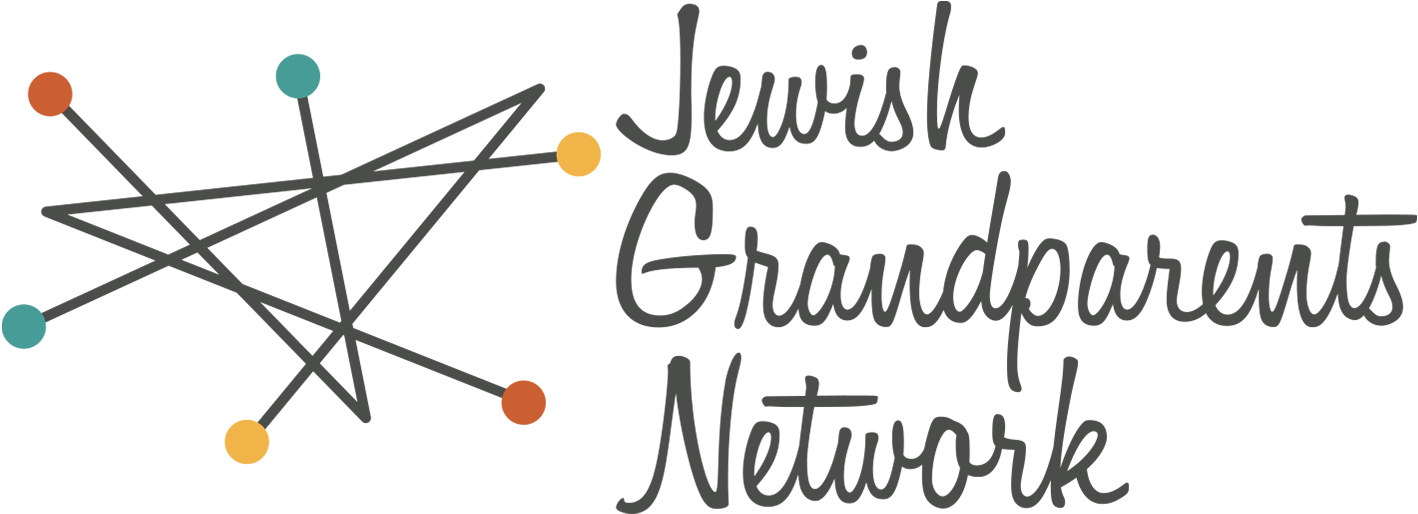
Sep 18 2020 Frog Tashlikh OR if a frog jumps into a pond…
Categories:
Holidays: JewishIntro to Frog Tashlikh:
We are taking a frog that grew from a tiny tadpole as part of an egg sac accidently dropped (we assume) by a bird into a container near my garden earlier this summer. This event became part of our ongoing lesson in incidental biology conducted during Gromzy Camp. I am Gromzy. Camp happened at my house most days this summer. For the longest time, there was a multitude of tadpole brothers and sisters but only one made it to full-blown froggie maturity. I discovered this when I finally emptied what had become a mosquito cesspool this past week. Out hopped one little guy (or gal) and I quickly scooped her up before a dog did and popped her into a terrarium with leaves, rock, twigs and a healthy helping of the scum she had been growing in so happily for the past few months. The next day, I added two more frog companions I found trapped in our crawlspace entry well. They die there unless rescued from the frying pan this space becomes.
I don’t have a pond or stream for overwintering but I do have access to two ponds in the fields behind my house where we do Tashlikh. It occurred to me that there might be something powerful in combining the frogs’ release and Tashlikh.
For my explanation of Tashlikh for family and friends: (scroll to Tashlikh Background at the end of Frog Tashlikh)
- To learn more about the background of Tashlikh:
https://www.myjewishlearning.com/article/tashlikh/
- For suggestions for many interesting ways to experience Tashlikh:
http://www.reclaimingjudaism.org/teachings/what-tashlikh-how-do-i-do-tashlich
- For a memorable and different Tashlikh experience (longer than Frog Tashlikh with Jewish prayers and texts):
https://highholidaysathome.com/booklet/ritual-for-tashlich-1
There are no fixed Tashlikh prayers though you will find a number of options if you search online or ask local educators or rabbis for their thoughts. Do what works best for your family!
Frog Tashlikh
Leader: There are many things in life over which we have no control. Sometimes this is scary. Sometimes it is beautiful.
Reader: Once a few months ago, we learned how tadpoles come from eggs and eventually turn into frogs that make eggs that become tadpoles all over again. This cycle is beautiful but we have no control over it.
Reader: Then one day, we discovered hundreds of tadpoles swimming in a big plastic container on our garden terrace. We didn’t put them there! But they were there. They seemed happy in their odd little pond. This was beautiful but a little scary because now that we knew they were there we realized that we had some responsibility for them. We added a rock and a branch to the big black tub. We couldn’t let their pond go dry during this hot, hot summer. And so we didn’t.
Reader: And at the end of this very long hot summer, one frog survived but our responsibility to this frog did not end. During the winter, frogs live in ponds. They need the right kind of shelter for survival just like every other creature on earth. We had to find the frog a pond and we did! We are also adding two more frogs we found in our crawlspace well because once they hop in, there’s no way to hop out.
Reader: We hope they will survive the winter to make more eggs that will turn into tadpoles next spring. We are letting them go so they can become who they are meant to be.
Reader: Are we certain that they will survive to complete this cycle? No. It’s a little scary to think that they might not. We will listen for the beautiful sounds of their frog song next April.
Reader: And we are doing what we can to help. That makes it a little less scary to think about their future.
(Release and watch the frogs swim into the water.)
Reader: Just as we helped the frogs, we help each other all year long to do things as a family. We take responsibility for one another. We do errands for each other. We take care of each other when someone is sick. We remember birthdays and favorite foods. We check in on each other and celebrate special holidays and achievements.
Reader: This year we helped each other to get through some very challenging times. Our jobs changed. School changed. Our social lives changed. Our celebrations changed. The world around us changed. Even the way we do our errands changed.
Reader: But we made it through the year with the help of one another, our community, first responders, special workers and helpers of all kinds. It’s the beginning of a new year filled with new challenges and new opportunities.
Reader: We let the frogs go so they could become who they are meant to be. Now we’ll let go of our old behaviors. These are the patterns, habits, and actions that hold us back, that prevent us from being the best people that we can be: the sisters, sons, daughters, mothers, brothers, fathers, grandparents, friends and community members that we all want and need to be for ourselves and for one another.
Leader: Gather your bread, seeds, leaves, crackers (whatever biodegradable objects you have chosen) for Tashlikh. Let’s read “In this New Year.” (Leader can either assign stanzas, alternate lines with group, read first line of each stanza or have group read whole reading together.)
In This New Year
In this new year:
I promise to work harder at being the best me I know I can be.
I pray for the strength to be reliable and fair,
A good listener and kind friend,
A person who thinks before she speaks,
Helps before he is asked.
I promise to work harder at holding back my anger
And unleashing my joy.
In this new year:
I pray for the strength to turn away from old habits
That fit me like my favorite old gym sneakers.
My mother doesn’t like the way they look but they feel so good to me.
My sister can’t stand the way they smell—she says they make her gag.
And my dog likes to chew on the laces even though that’s not good for him.
It’s hard to give up things I’ve lived with for such a long time.
In this new year:
I pray for the courage to act
When I know an injustice has taken place,
And all around me others are choosing not to act.
I pray for the wisdom to choose action
That will make a good difference
And may persuade others to act too.
In this new year:
I pray that I can remember to remember what I promised.
I promise a lot because it is easier to say yes than no.
Then I end up saying no to my yeses.
I hope this will be the year I learn to say no and make my yeses
The promises that I can remember.
In this new year:
I pray for patience with myself and all my loved ones.
The long span of history suggests that in difficult times
Hope does more for us than despair.
I choose to be hopeful about our future.
And to act based on that choice.
I will be more than content with what I have.
I will rejoice in my fullness and work to assure that others have that same privilege.
I will watch less news and see more life, listen to fewer podcasts and talk to more family members.
I will make a new friend.
I will renew an old friendship.
I will get involved in a new cause.
I will learn one new thing every day.
I will tell someone who has never heard it from me that I love them.
ALL: We pray for the strength, the wit, the courage and the resolve to do all of these things and more.
Leader: Please name (silently or out loud) the things you wish to change—the behaviors you will turn away from and the behaviors you would like to turn toward in the coming year as you toss your Tashlikh offerings into the pond.
Wish each other a Shanah Tovah (a Good Year)!
Tashlikh Background:
IDEA
Toss object: bread crumbs, fish food, bird seed, lint from pockets, pieces of paper or leaves with behaviors, negative acts, or thoughts written or attached to them, into a body of water that carries old behaviors that you want to change away from you.
HISTORY: Goes back to medieval period circa 13th century (most likely)
The ritual is based on the last verse of Micah: (7:19), “He will take us back in love; He will cover up our iniquities. You will cast all their sins into the depths of the sea.”
Rabbis worried that Jews would turn this into a superstitious practice and think that the act of tossing objects into water might substitute for sustained teshuvah (repentance through reflection and prayer). Many tried to discourage it. However that didn’t work.
Tashlikh (which mean “you will cast away”) has become increasingly popular in recent years as many Jews have embraced the symbolic power of the ritual.
WHERE AND WHEN:
Tashlikh is usually performed the afternoon of 1st day of Rosh Hashanah (Saturday, September 19 this year). If the first day of Rosh Hashanah falls on Shabbat, Ashkenazi Jews [Jews of European descent] do Tashlikh on the second day . Sephardic Jews [Jews of Mediterranean and Middle Eastern descent] perform the ritual even on the Sabbath [as do many liberal Jews].
If you can’t do it then, then do it any time during the Yamim Nora’im (10 Days of Awe, the Days of Repentance between Rosh Hashanah and the end of Yom Kippur—September 28, 2020) or even all the way to the end of Sukkot (October 9, 2020).
Go to a lake, stream, or pond. Rabbis prefer it to be done in a body of water near fish (possibly to remind us of fish who cannot escape the fisherman’s net, just as we cannot escape God’s judgment). You can even use a garden hose in the back yard.
WHO:
All ages can participate. Rituals are powerful this way. When they work, they are carriers of meaning pulling way more freight than words alone. A strong ritual is meaningful for all ages without lots of explanation.
HOW:
Think beforehand, individually or as a family about the behaviors that have held each person back over the past year. What can you change or let go of to be different in the coming year?
Examples:
- I will listen more carefully when others speak.
- I will let go of my tendency to lose my temper easily.
- I will work to find solutions to problems first instead of fighting.
- I will be more patient.
- I will assume the best of the people around me.
- I will offer help before being asked.
- I will wake up grateful.
WHY
This is a wonderful introduction to the reflective practice of teshuvah. What do we want to change about ourselves? What can we do better and differently? How can we change our relationships with one another?
Teshuvah (returning) is about asking for forgiveness for the harmful behaviors we have engaged in towards others (human beings and God) and then turning away from those behaviors when we have the opportunity to repeat them. Ultimately it means returning to the good person we are meant to be.
Teshuvah is a multi-stage process. Over the centuries, we have developed many devices and supports to help us do the hard work of examining our behavior honestly, taking responsibility for what we have and haven’t done well, asking for forgiveness, and changing so we are not caught in the endless trap of doing the same things and expecting that an apology or a once a year effort at forgiveness without real change will fix the damage that we have done.
To name just a few:
- We can spend part of each day during the month of Elul leading up to Rosh Hashanah to reflect on our behavior and the ways we would like to change.
- We can pray in community during the Holy Days using liturgy (prayers) specifically designed to help us acknowledge our frailty, the damaging things we have done, and the forgiveness we seek.
- We can go to our friends and loved ones during these ten days and ask for their forgiveness for what we may have done to harm them over the past year.
- We can listen to the shofar and heed its call to think about who we are and who we want to be.
- If we have a personal relationship with God and believe in God’s judgement we can think about the kind of relationship we want with God in the coming year and what we need to do to merit it.
- We can do tashlikh and give a physical expression to the behaviors we hope to change and the ways we would like to move forward.
- We can consider that though we focus on teshuvah at this time of year it can be a year round and life long process. If we want to grow our entire lives we will always be in relationships with all of creation and those we cherish. We are human and imperfect so we will all make mistakes. Most of us learn and grow more from our mistakes. If we hurt others in the process part of our growth depends on understanding how and why that happened.
- The 6 R’s of Teshuvah:
Reflect: consider your interactions and behavior, what did you do that was harmful to others, what did you do that brought out the best in them?
Take Responsibility: Take responsibility for the choices you made. Life is filled with challenges. We are not always in charge of the challenges but we can choose how we respond. We are all great at justifying why we did what we did. Often this includes blaming others. The hard part is acknowledging that we made a choice and we are responsible for the choice we made.
Repent: If you made choices that you understand damaged others in ways you could have prevented, ask for forgiveness.
Reconcile: Hopefully your repentance is sincere. If your repentance is accepted and the relationship can sustain the damage determine together if there is more repair work to be done.
Repair: Determine what you (and perhaps the other party) have to do to repair the damage to the relationship to move it forward. Make good on your promises.
Resist: When or if the opportunity to repeat the same behaviors occurs again, resist engaging in them. Real change has occurred.
Shanah Tovah U’metukah – A Happy, Healthy, Joyous and Safe New Year,
Lee M. Hendler
President, Jewish Grandparents Network



 We use technologies like cookies to remember your preferences. Consenting to these technologies will provide you with a better browsing experience. JGN never shares information about your use of our website.
We use technologies like cookies to remember your preferences. Consenting to these technologies will provide you with a better browsing experience. JGN never shares information about your use of our website.